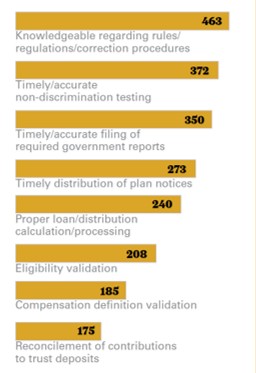The third-party administrator, or TPA (bear in mind that a recordkeeper is also a TPA) can be a key advisor ally—or, if expectations aren’t aligned—the bane of a customer relationship. What’s most important in an advisor/TPA relationship?
Now, it has been well-established in previous Summit Insider reports that service is the dominant reason for hiring (and terminating) a relationship with a third-party administrator, a.k.a TPA.
We asked some 600 advisor attendees at the 2023 NAPA 401(k) Summit (a.k.a. our “Summit Insiders”) to provide some context for what “service” includes.
How would you define service in this context (Summit Insiders were asked to check all that apply).

| Knowledgeable regarding rules/regulations/correction procedures | 463 |
| Timely/accurate non-discrimination testing | 372 |
| Timely/accurate filing of required government reports | 350 |
| Timely distribution of plan notices | 273 |
| Proper loan/distribution calculation/processing | 240 |
| Eligibility validation | 208 |
| Compensation definition validation | 185 |
| Reconcilement of contributions to trust deposits | 175 |
Those categories notwithstanding, verbatim comments from Summit Insiders repeatedly commented that while those were the “what’s”—the “how” was really the most critical element. In fact, timely responses to calls/emails—came up a LOT! As one reader noted, “They can be great at everything on the list but if they are not responsive they are useless.”
Here are some other comments:
Within the last 2-3 years, to my team, "service" has almost exclusively come to mean 2 things: 1) responsiveness or lack thereof, 2) the functions that make up the TPA's offering to a client. Responsiveness has diminished, and the number of functions performed have been reduced.
With TPA Consolidation the service aspect has gone way down...we are now looking at going completely bundled with all plans because of this.
While critical, the above are tasks. The key element is the timely and responsive communications with the plan sponsor to questions and in assisting the plan sponsor with their duties. The TPA in the micro and small plan market is an extension of HR and part of the team they rely on.
TPAs need to be proactive problem solvers!
TPAs focus on compliance work not relationship building which makes them vulnerable. Too often being the police and not the partner
TPA communication and soft skills are underrated. When working with plan sponsors who are worried about making a correction, TPAs are incredibly valuable. However, sometimes (say on the first phone call to explore a corrections issue) plan sponsors need to feel that they're supported and that they'll be (relatively) ok before getting into the technical details. If that isn't successfully communicated, the problem can end up looming even larger in the plan sponsor's eyes after the call.
Thorough knowledge and understanding of the details that go beyond mine; a true plan design/compliance consultant—not just a "tester"...there's a serious shortage of capable TPAs out there.
They are a dying breed. With RK consolidation, same with TPAs but now it’s easier to go bundled and have a cohesive look/feel to the plan.
The above means less...for me, when TPA's comment they are too busy because they are in testing season or they have other deadlines to meet it is a complete turn off. I do not like the bundled providers b/c they do not allow personalization and make clients believe they are unimportant. TPA's who put off a client request to run projections using data for a match etc. is unacceptable. Clients pay for personal touch. Some TPA's have forgotten that clients can bundle if there is no better service.
Proactive review of plan to avoid determining issues after the end of the year, i.e. missed/late contributions, contributions deposited to wrong source, partial plan termination, failure to automatically enroll.
Obviously all are important but I think the primary reason to utilize a TPA is the compensation definition validation--and as a part of that—the ability to best calculate new comp/SS integrated, etc. type of tests to assist with P/S contributions for HCE's/owners
Most recordkeepers are bundling these services putting the TPAs out. Unless there are multiple plans at the sponsor or a very unique plan, the TPA services and fees are redundant.
Love working w TPAs—greatly helps reduce the workload for smaller or more complex plans!
Keeping the same contact at the TPA for all my plans versus feeling like it's someone different every time I call. It's all about the relationship at this point.
I've found that when a TPA is involved there tends to be a communication gap between the Recordkeeper/TPA/Plan Sponsor. The TPA and Recordkeeper tend to point fingers at each other. They say "that's not us, go to your recordkeeper" instead of forwarding the email or message TO the recordkeeper and asking them to review and reach out to the client.
Interesting question—historically service from a TPA has been acclaimed, but with fee pressure and turnover of TPA staff, the quality of consultation and knowledge has greatly decreased. Many TPA firms have not been able to pay growing costs of business, including cybersecurity technology, and many knowledgeable owners have retired and sold businesses. This world is changing.
I think the most important consideration is to have a TPA partnership that is committed to delivering a great client experience (along with being great at their jobs!).
I think the biggest issue is fee compression along with rising salaries/costs have put TPAs (and many of us) in a bind with service. Everyone is doing more with the same amount of time they have always had.
I see a trend away from bundled services back to a recordkeeper/TPA service model due to lack of service and accessibility by the recordkeepers.
I have quite a few small business owners and the level of assistance they receive from their TPA partner is so important. Had an issue surface while I was at the Summit and my TPA partner stepped in immediately with the quick response. Some are definitely better than others!
I expect any TPA partner to deliver all of the above. Termination for service is due to inability to return phone calls or have "urgency" to deliver quality work. OR to be accountable for mistakes. Proper communication for who does what can also be an issue, as advisor we assume that we are primary relationship manager with client.
I expect all those to be done, I want weekly updates on pending plans and challenges before they become challenges.
Generally, we return about half of the 5500s for corrections each year. There seem to be quality control issues.
General customer service has become a huge issue after Covid. Answering emails, answering ALL the questions that a client asks in their email, understanding that customer service is a part of their job, and thinking one or two steps ahead when a client asks a question. Why are they asking, is there another issue we need address or questions to be asked, and notify the advisor of issue when they arise.
Design expertise and thoughtfully helping the client resolve pain points using their knowledge of the tax code and plan modifications permissible with DOL.
Communications with the TPA has been an issue for a couple of our plan sponsors and for us.
All of the above responses are basic "must-haves" for a TPA. However, responsiveness to advisors and sponsors is of key importance. I presume the TPA will do their job (see above), and I don't care how great you are if I can't get the info I need from you when I need it.
TPAs are often hired for a more personalized service/hand holding, so they need to be willing to service this way.
Check out the rest of the 2023 NAPA Summit Insider at https://bit.ly/23Summitinsider1

